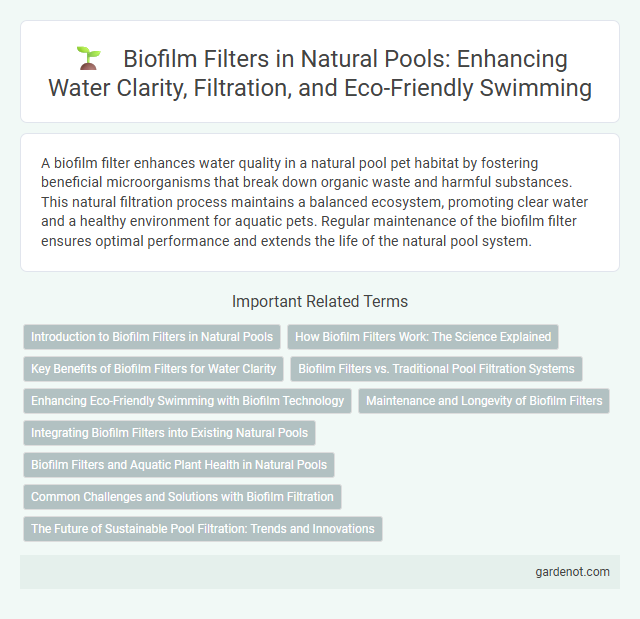A biofilm filter enhances water quality in a natural pool pet habitat by fostering beneficial microorganisms that break down organic waste and harmful substances. This natural filtration process maintains a balanced ecosystem, promoting clear water and a healthy environment for aquatic pets. Regular maintenance of the biofilm filter ensures optimal performance and extends the life of the natural pool system.
Introduction to Biofilm Filters in Natural Pools
Biofilm filters in natural pools utilize beneficial microorganisms to break down organic matter, enhancing water clarity and quality without chemicals. These filters promote a balanced aquatic ecosystem by supporting microbial communities that consume nutrients and contaminants. Efficient biofilm filter systems reduce maintenance needs and create a sustainable environment for swimmers and aquatic plants.
How Biofilm Filters Work: The Science Explained
Biofilm filters operate by harnessing beneficial microorganisms that form a thin biofilm layer on filter media, effectively breaking down organic waste and harmful pathogens in natural pools. These microbes metabolize contaminants through aerobic and anaerobic processes, converting them into harmless compounds that improve water clarity and quality. This biological filtration mimics natural aquatic ecosystems, promoting sustainable and chemical-free water purification.
Key Benefits of Biofilm Filters for Water Clarity
Biofilm filters enhance water clarity by promoting the growth of beneficial microorganisms that break down organic matter and contaminants, reducing turbidity and algae growth. These filters create a natural, self-sustaining ecosystem that minimizes the need for chemical treatments and mechanical filtration. By improving the biological balance, biofilm filters maintain clear, healthy water in natural pools.
Biofilm Filters vs. Traditional Pool Filtration Systems
Biofilm filters in natural pools utilize microbial communities to break down organic matter and maintain water clarity without chemicals, outperforming traditional filtration systems that rely on mechanical filtration and chemical treatments. These biofilm filters support a balanced aquatic ecosystem by promoting beneficial bacteria that degrade pollutants naturally, reducing maintenance and environmental impact. Unlike conventional sand or cartridge filters, biofilm filters enhance water quality through biological processes, making them ideal for sustainable, eco-friendly pool management.
Enhancing Eco-Friendly Swimming with Biofilm Technology
Biofilm filters harness natural microbial communities to purify water, significantly enhancing eco-friendly swimming environments by reducing chemical usage and maintaining biological balance. This technology promotes sustainable water clarity through effective organic matter breakdown and nutrient cycling within natural pools. Incorporating biofilm filters supports vibrant aquatic ecosystems while ensuring safe, chemical-free water for swimmers.
Maintenance and Longevity of Biofilm Filters
Regular cleaning of biofilm filters is essential to maintain optimal water flow and prevent clogging, ensuring effective natural pool filtration. Using gentle brushes or backflushing techniques can prolong the filter's lifespan without damaging the beneficial microbial layer. Monitoring filter performance and replacing media when necessary helps sustain biofilm activity and guarantees long-term pool water clarity.
Integrating Biofilm Filters into Existing Natural Pools
Integrating biofilm filters into existing natural pools enhances water clarity by promoting beneficial microbial communities that break down organic matter and contaminants. These filters leverage surfaces with high surface area, such as gravel or specialized media, to support biofilm growth, which naturally processes nutrients and reduces algae proliferation. Optimizing the placement and maintenance of biofilm filters ensures balanced ecosystems while maintaining the chemical-free, sustainable qualities of natural swimming pools.
Biofilm Filters and Aquatic Plant Health in Natural Pools
Biofilm filters in natural pools play a critical role in maintaining aquatic plant health by fostering beneficial microbial communities that break down organic matter and improve water quality. These biofilms enhance nutrient cycling, reducing harmful algae growth and supporting the symbiotic relationship between plants and microbes. Optimizing biofilm filter conditions promotes a balanced ecosystem, ensuring robust plant growth and clear, natural pool water.
Common Challenges and Solutions with Biofilm Filtration
Biofilm filters in natural pools often face challenges such as clogging due to excessive organic matter accumulation and uneven biofilm growth that reduces filtration efficiency. Solutions include regular maintenance like gentle scrubbing to remove excess biofilm, optimizing water flow to prevent dead zones, and balancing nutrient levels to promote healthy microbial activity. Employing diversified microbial communities enhances biofilm resilience and improves overall water quality in natural pool ecosystems.
The Future of Sustainable Pool Filtration: Trends and Innovations
Biofilm filters represent a cutting-edge advancement in natural pool filtration, utilizing beneficial microbial communities to break down organic matter and improve water clarity without the need for harmful chemicals. Emerging trends in sustainable pool filtration emphasize the integration of biofilm technology with renewable energy sources and smart monitoring systems to enhance efficiency and reduce environmental impact. Innovations in biofilm filter designs aim to optimize surface area and microbial diversity, ensuring more effective pollutant removal and promoting eco-friendly maintenance practices.
Biofilm filter Infographic

 gardenot.com
gardenot.com